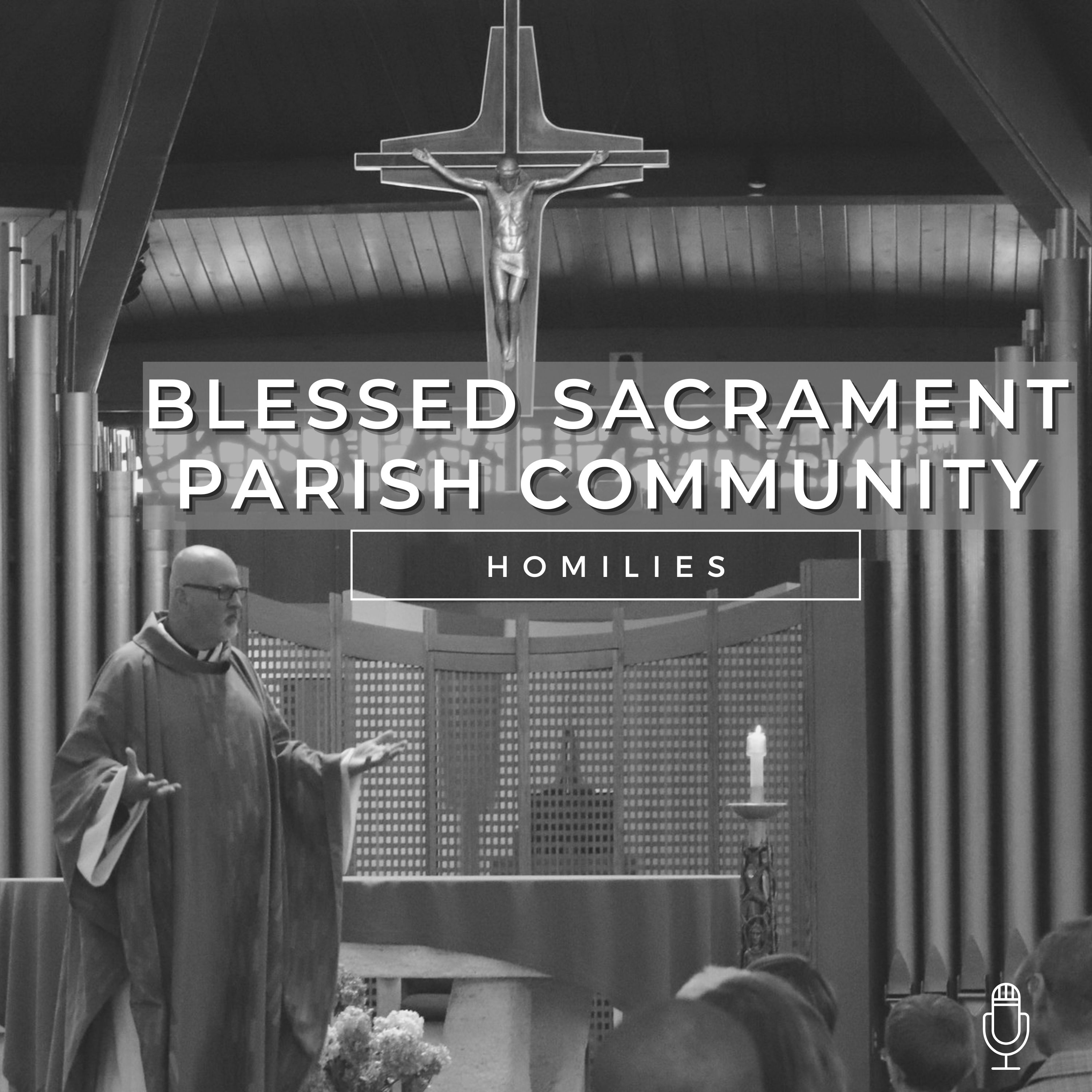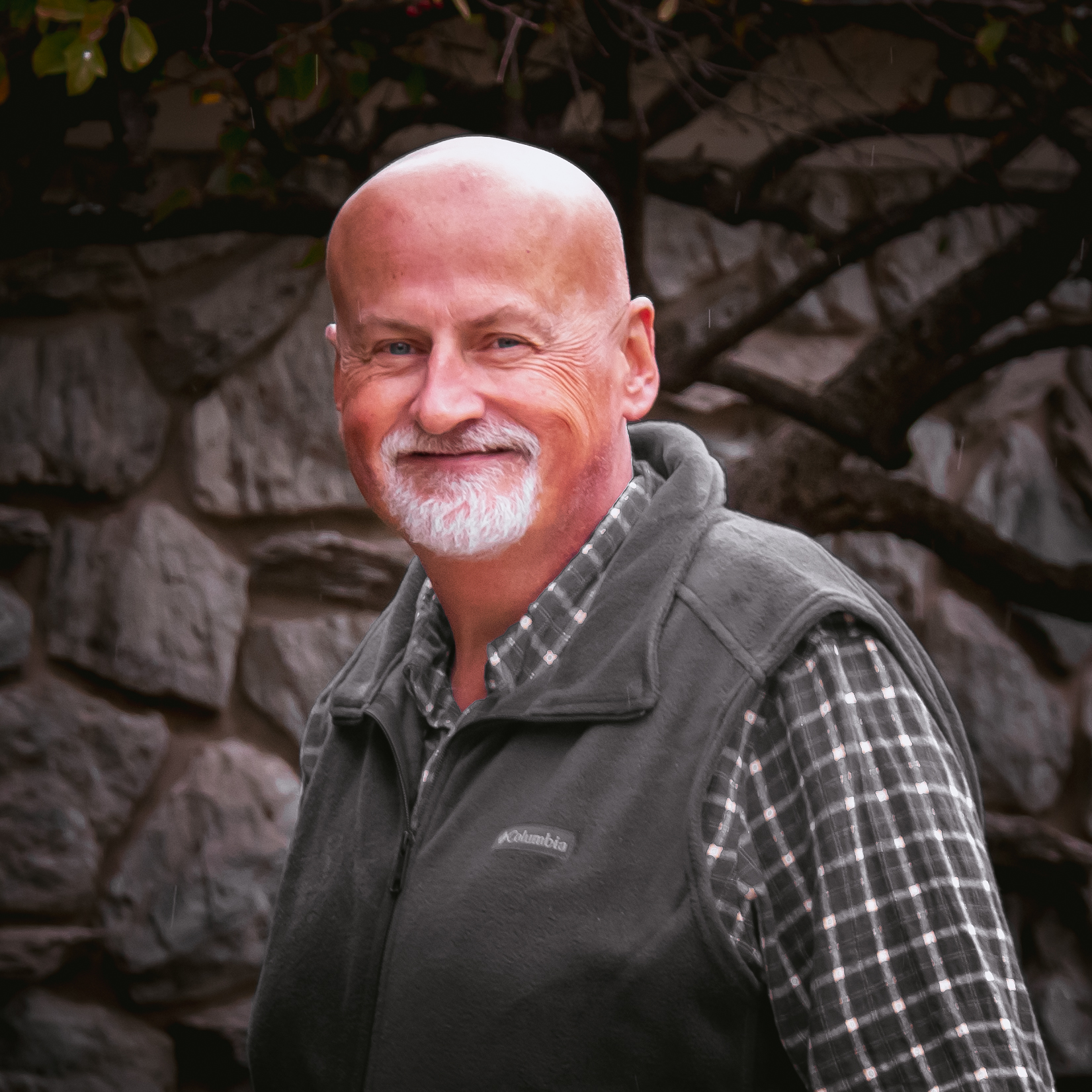Episode Transcript
[00:00:12] Speaker A: Welcome to the Blessed Sacrament Homilies podcast where our mission is to help everyone recognize and experience the presence of God. We hope you are nourished and encouraged by the Word. Thank you for joining us.
[00:00:26] Speaker B: The Lord be with you.
Reading from the Holy Gospel according to John.
[00:00:31] Speaker A: Glory to you, O Lord.
[00:00:33] Speaker B: Since the Passover of the Jews was near, Jesus went up to Jerusalem.
He found in the temple area those who sold oxen, sheep and doves, as well as the money changers seated there.
He made a whip out of cords and drove them all out of the temple area with the sheep and the oxen and spilled the coins of the money changers and overturned their tables.
And to those who sold doves, he said, take these out of here and stop making my father's house a marketplace.
His disciples recalled the words of Scripture, zeal for your house will consume me.
At this the Jews answered and said to him, what sign can you show us for doing this?
Jesus answered and said to them, destroy this temple, and in three days I will raise it up.
The Jews said, this temple has been under construction for 46 years and you will raise it up in three days.
But he was speaking about the temple of his body.
Therefore, when he was raised from the dead, his disciples remembered that he had said this, and they came to believe the scripture and the word that Jesus had spoken the Gospel of the Lord.
[00:02:08] Speaker A: Praise to you, Lord Jesus Christ.
[00:02:11] Speaker B: Bishop Grus has asked all the priests of the diocese to set this weekend aside to tell our vocation story.
And while I'm going to do that, I don't think I'm really doing my job if I don't first talk just for a moment about the Scriptures, because that's what a homily is supposed to be about.
So what I want you to glean out of this Gospel is what the majority of scripture scholars would say happened in this event.
Most would argue that this was the beginning of the end for Jesus, because prior to this, the only people he irritated were the hyper religious.
But with this action, he created a social disturbance which also would have irritated the Roman government of the time.
And the Romans would put up with virtually anything. You could worship who you wanted, do what you wanted, as long as the status quo was okay.
But the moment there was a bit of social unrest, they were on edge and would not hesitate to put someone to death to keep things calm.
So here in this Gospel, we have the Roman leadership as well as the temple leadership in agreement. This Jesus was trouble and that was the beginning of the end for him.
Now to Talk about my vocation story.
I think it has to probably begin back when I was just a real little kid, like three, four years old, because that was the time I can remember my parents teaching me those prayers we know so well, like the Lord's Prayer.
From the very beginnings of my memory, faith was important in our family, and not only that, but our parish church. And in fact, the church in the big picture was always taught to me to be like a second home, that it should be a place where I feel welcomed and comfortable. And I always thought if I ever got lost as a little kid, the first place I'd go would be to a church, because that was my home.
And I watched my parents be of service around the parish. My mother taught a first communion class for as many years as I could remember.
My dad, being an electrician, used to volunteer doing all kinds of work around the parish.
And our family was super close to our pastor, Father Obohusky, who was a good old Hamtramck Polish priest who was out in the Detroit suburbs.
And he was the closest thing I had to a grandfather.
Both of my grandfathers had died long before I was born.
And he always seemed to be that role for me.
I loved him, and I loved how he ministered to our parish.
And he was family.
But I never really felt like I could be like him because I never felt churchy enough.
And I never knew what that term meant until, frankly, when I was adult. What I really meant was I wasn't pious enough.
So I didn't think about it too much.
But then, with the promptings of Sister Miriam, who was on staff there, Annette.
I started to think about the possibility of vocation. This is my early teen years, and I made that fatal error that we can all sometimes make.
I told that to my father, who was hyper supportive of things and was really supportive of that.
So we gathered together a few months later at a family gathering, and absolutely every cousin, aunt, uncle, third cousin twice removed came up. Oh, you're going to be a priest?
Well, when you're 13, 14 years old, if your parents like something that much, it can't be good.
So I forgot about it for years.
But still, our parish and the church was home.
And in fact, going off to college, I think I was, at least as far as I knew, the only one of my friends that still went to Mass every weekend.
And I didn't go out of guilt. I didn't go out of fear. It is just who I am. I needed to be there. I needed it for myself and the Church, in its wisdom, of course, had Saturday evening mass, so I could still go out with my friends and not get up on Sunday morning. So it was perfect.
But then after being graduated from college, I started to work, and nothing quite felt. Felt right.
There was something missing.
And then one day I happened to be reading the Free Press, and there in the back of the sports page was an advertisement looking for priests in the Archdiocese of Detroit.
So I made a phone call inquiring, and they asked, well, where's your family live? And I said, well, my folks are in Caseville.
Well, that's in the Diocese of Saginaw. You better talk to them first.
So I put it off again for a couple of months. I tried to make the first step, and I kind of got pushed back a little bit, but that feeling kept resurfacing.
So I called the diocese and ended up going in for an interview.
And the people I met there was a whole team at the diocese that you would interview and talk to.
Seemed like the right place to be.
They were good listeners.
They weren't giving me the hard sell.
They just said, you need to be open to wherever God calls you.
So after a period of discernment, I started seminary.
And during that time, I enjoyed the academics of it and all the rest, but wasn't 100% sure yet.
I thought back to those priests that I liked, Father Obohusky, Father Jim Mayworm, who was at the neighboring parish and was the best preacher I heard next to Ken Hutner. The guy was phenomenal.
In fact, I ended up calling him up about 15, 20 years ago, found him in the directory just to share that with him. And I think he was kind of almost crying on the other end of the phone because nobody had told him that before.
But I kept thinking about it and I go, I don't know. We had a gathering up in Au Gray at one of the now deceased priest cottage with the bishop and the vocation staff.
And I went for a walk with Bishop Muntner, and I told him, this is just before I was due to be ordained a deacon. I'm not sure I'm ready for this or I want to do this.
And he listened and he said, well, you know what? You have to follow where God's calling you and where your heart is.
Do not feel pressure.
Do what Jesus leads you to do.
Well, that is all he had to say because he took all the pressure off my shoulders. I never felt like I had to be pushed into this.
And I quickly decided, yeah, this is what I want to do well, those first years, you're just trying to get your footing. And I can remember walking out of St. Stan's parish and a lady walked up to me and she said, you don't really seem like a priest.
Now, that gave me PTSD going all the way back to when I was a little kid thinking I wasn't churchy enough.
And I was really devastated. But she only paused for about 15 seconds, and she meant it as a compliment.
She said the priest she had as a kid scared the heck out of her and that she never felt she could talk to them.
But she said, you're always joking around with people and you're sitting there kind of gabbing away before Mass.
I feel comfortable with you.
And I really appreciated those words.
Now, what I'm going to ask of you is that if you think of anybody who may be able to do this and might actually thrive at it, to talk to them about it or to share their name with us, it is amazing how words can change somebody's life.
And I'm going to give you one last example.
1997, probably around May of that year, I was here as an associate, and I got a phone call saying I was appointed to St Vincent de Paul in shepherd and St Leo and Wayne as pastor.
And I was scared to death.
I didn't feel like I was ready. I didn't feel like I could do it.
And Bishop Untner said to me, you are the perfect person for this job.
And that gave me the confidence I needed to go in there and do it.
Well, fast forward from that moment about six months, and we were at a gathering of priests, and I shared how powerful that was.
And one of our older priests said to me, he tells everybody that he probably didn't even know where you were going.
So your words do matter, and hopefully nobody will negate them.


